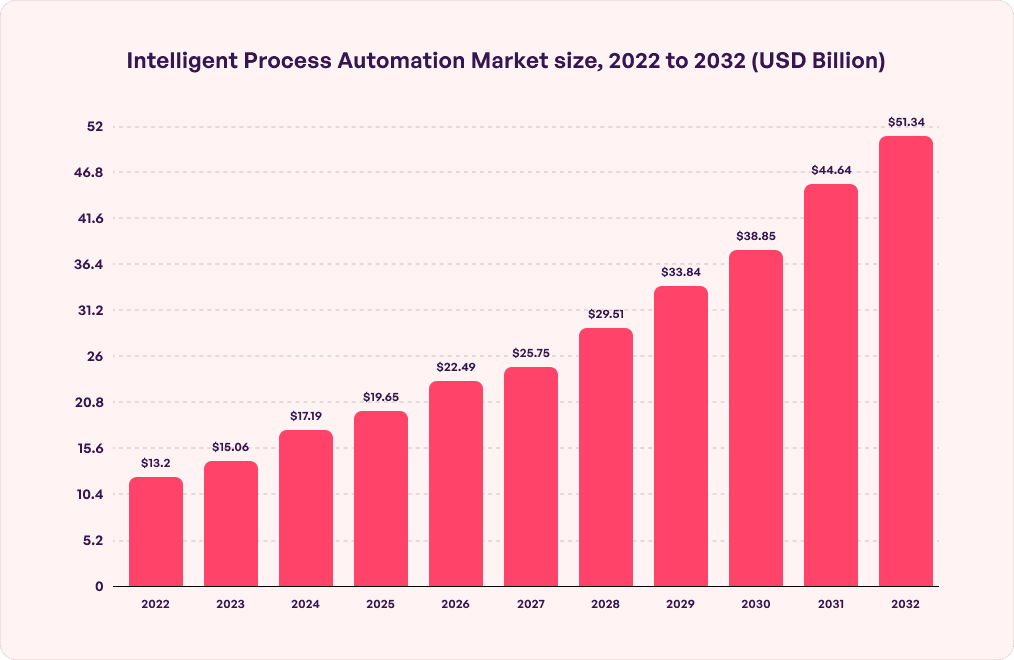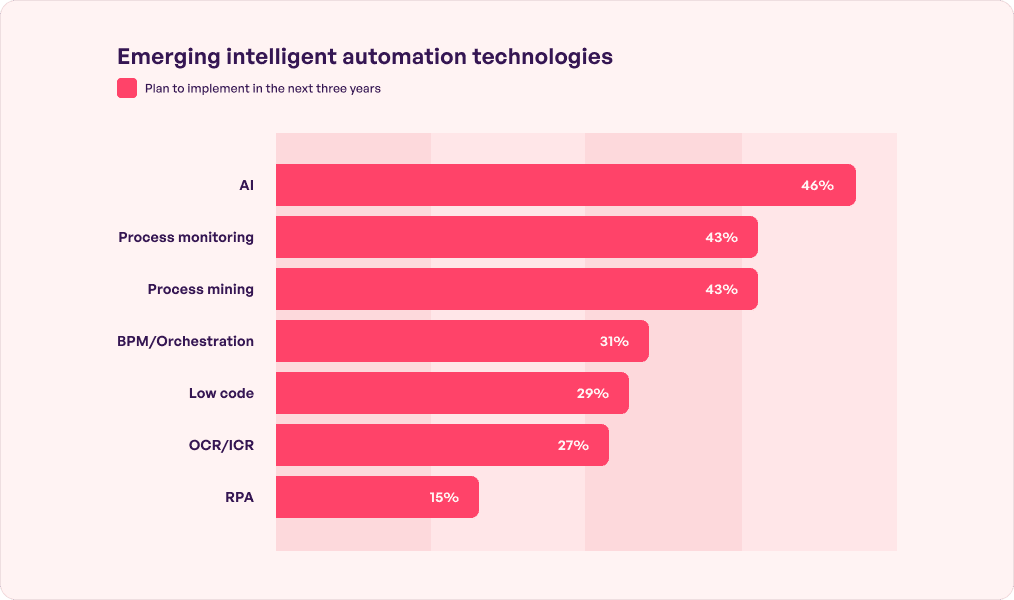Every mid to large-scale business, irrespective of the size and industry they belong to, is facing a similar issue. There’s too much information and an equal-sized unclarity of which information is useful and how.
At the intersection of a massive information set and unsurety of how to identify important information lies intelligent automation. Intelligent automation (IA), is the application of automation technologies – business process management (BPM), artificial intelligence (AI), robotic process automation (RPA), and Computer Vision – to streamline and scale up decision-making across businesses.
But just because there is a technology promising to make sense of your business data for you while automating your processes, do you need to incorporate it?
Whenever a client comes to us asking for intelligent automation in business, we ask them five questions whose answers then take the conversation ahead.
- Do you need more scalability? Your business has plans to grow in the future – new customers, sales territories, etc. but are your processes ready to scale with this growth when these targets are achieved?
- Do you have a lot of manual work? Is the majority of your day going behind manual task completion like transferring information from one system to another?
- Are there a lot of exceptions? If you have already applied automation, are you seeing exceptions because of unstructured, semi-structured data, multiple formats, or system errors?
- Is there a lack of end-to-end process visibility? Do you have complete visibility of the company-wide processes and can you track and measure them?
- Do you have a single source of information? A common sign to answer this is by looking into the number of sources you have to go through to collect or compare your data.
Assuming 4 out of these 5 questions were a ‘Yes’ for you too (even one yes would have been a good enough reason), this AI business automation article is for you. Let’s look into the trending technology and what you can expect from its implementation.

Table of contents
What are the components of intelligent automation?
When you seek the answer to what is intelligent automation? You will get an answer that the technology consists of a series of digital processes that work in a collaboration-powered system to optimize workflows. On a foundational level, multiple technologies power this process.
Artificial Intelligence
AI as you would already know solves cognitive issues linked with human intelligence. Powered by a toolset made up of NLP, Machine Learning, etc. it uses business data to become more effective after every transaction, interaction, and event.
Machine Learning
It is the science of using models and algorithms to enable machines to perform tasks without any instructions. With the help of historical data, patterns, and inferences, the technology helps machines predict outcomes and act on them.
Natural Language Processing
The technology enables computers to understand and interpret human language. The text data that you feed into an NLP software, ranging from emails, and texts to social media posts, can be processed for finding trends and replying to people like humans.
Computer Vision
It gives the software human-like accuracy by identifying things, places, and people in images. The technology helps with the automation of processes like image extraction, classification, and identification.
In addition to these core components, several other technologies are finding a place in the working of intelligent automation, here’s a look at them –

These elements that make intelligent automation in business possible, tend to leave a huge company-wide impact – ones that also define the benefits of intelligent automation.
The benefits of business process automation
AI business automation powers businesses with advanced-level technologies and agile processes for smarter and faster decisions.
Cost and time savings
With the automation of time-consuming and repetitive tasks, intelligent automation technologies can lower the need for human intervention, thus saving valuable business resources and time. The streamline capability this offers directly leads to better operational efficiency and cost savings.
Better accuracy
Intelligent automation tools lower human issues and guarantee consistent intelligent document processing. With the help of AI-powered real-time data validation and decision-making, companies get access to reliable and accurate information which helps them get both proactive and predictive.
Improved efficiency
Some of the top applications of intelligent automation can be seen in optimized workflows, eliminated bottlenecks, and improved efficiency. With the automation of activities like document processing, data entry, and reporting, companies can have a dedicated focus on the core business goals and strategic activities.
Increased data integrity
Cognitive automation lowers the probability of data errors and inconsistencies, improves data reliability and integrity. Automation of validation and data extraction makes sure that companies have real-time access to accurate and clean data for reporting.
Compliance-readiness
With the automation of compliance-specific processes and maintenance of standardized workflows, companies can ensure adherence to all regulatory requirements. Intelligent business automation also helps with enabling documentation and audit trails, which simplifies the overall compliance reporting journey.
Elevated customer experience
Intelligent automation in business powers personalized customer experience through automated customer support, customized marketing campaigns, and effective, on-time query resolution. This leads to a direct impact on loyalty and customer satisfaction.
Now that we have looked at the benefits of cognitive automation, let’s study how these translate into the easing of everyday work processes.
The most visible intelligent automation use cases
Business process automation sees a wide range of applications across industries and business sizes. An example of this can be seen through three very popular but very different companies and how they are using the technology.
- Coca-Cola – using intelligent automation to streamline supply chain management
- IBM – using IA for optimizing the financial reporting process
- JP Morgan – implemented the technology for automating the data analysis of large volume legal documents.
Here’s a more intricate-level view of how intelligent automation implementation can help your business.
Financial reporting automation
The technology can streamline the financial reporting process by automating data gathering, processing, and analysis. It is also able to generate real-time reports, collect data from multiple sources, and power accurate analysis.
Contract management automation
Intelligent automation makes contract management efficient with the automation of contract creation, monitoring, extraction of relevant data, analysis of terms and conditions, and compliance adherence.
Customer support automation
IA betters customer support with the automation of response generation, ticket management, and issue redressal. Businesses also employ AI-based chatbots for providing instant support and managing routine queries.
Fraud detection
The technology plays a role in enhancing fraud detection and its prevention by studying large data sets and automating the processes around risk assessments, real-time alerts, and security measures.
Marketing and sales automation
Intelligent automation elevates sales and marketing efforts by automating segmentation, lead generation, and campaign execution, which ultimately results in sales productivity. On the other hand, the technology makes it easy for marketers to send emails, plan data-backed social media campaigns and advertisements, etc.
With this, you have all the information you would need to get started with the implementation of intelligent automation in your business. The next and last step is to know how.
Usually, you will have two options when it comes to getting into this set of AI development services – invest in a ready-made intelligent automation system or build one from scratch and then add integrations to make it powerful.
If going with the first option, you can opt for these software –
- IBM Cloud Pak for Business Automation
- UiPath Business Automation Platform
- Automation Anywhere Automation 360
- Microsoft Power Automate
If opting to build it yourself, here is what the process would look like.
Requirements Gathering and Design:
- Define the scope of automation.
- Identify processes to be automated.
- Design user interfaces.
- Define integration points with existing systems.
Cost Range: 10-20% of the total project cost.
Development:
- Implement automation workflows.
- Develop and integrate AI/ML algorithms.
- Implement user interfaces and user experience.
- Integrate with existing systems and databases.
Cost Range: 50-70% of the total project cost.
Testing:
- Perform functional testing.
- Conduct performance testing.
- Validate integrations and data flows.
Cost Range: 15-25% of the total project cost.
Deployment:
- Rollout automation to production environment.
- Train users and support staff.
Cost Range: 5-10% of the total project cost.
Maintenance and Support:
- Provide ongoing support.
- Address issues and bugs.
- Perform updates and enhancements.
Cost Range: 15-20% of the total project cost (per year).
Ready to get started with intelligent automation implementation in your business process? Get in touch with our AI development experts to get started within a week.
FAQs
Q. How does intelligent automation work?
A. Intelligent automation makes use of machine learning (ML) and other cognitive technologies for continuous collection, processing, and analysis of data. This continued process powers the technology to suggest data-based insights to your business while automating all the manual processes.
Q. What are the components of intelligent automation?
A. The core components of IA include – AI, Machine Learning, Natural language processing, and Computer vision.
Q. What is the purpose of intelligent automation?
A. The need for intelligent automation can be studied by knowing the benefits of the technology.
Here are the top ones –
- Cost and time savings
- Better accuracy
- Improved efficiency
- Increased data integrity
- Compliance-readiness, and
- Elevated customer experience.
Q. What’s the difference between intelligent automation and robotic process automation?
A. RPA can only automate a task once it’s programmed to do it. Meanwhile, intelligent automation can learn task automation through cognitive decision-making abilities.




